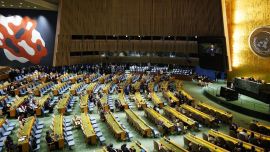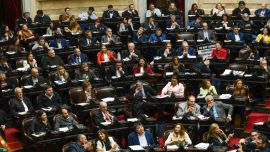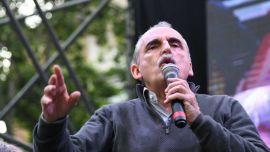Although political overtones and the weight of history mark the positions of Latin Americans on the war between Israel and Hamas, most of the region's left-wing governments maintain their traditional support for the Palestinian cause and, with Brazil at the forefront, advocate a peaceful solution.
Since the October 7 massacre by the Islamist group Hamas on Israeli territory, an attack in which some 1,400 people were killed, Israel has relentlessly bombed the Gaza Strip, causing at least 7,000 deaths to date, according to the Palestinian movement.
Among the dead are at least nine Argentines, three Brazilians, three Peruvians, one Colombian, one Chilean and one Honduran, as well as some 30 missing Latin Americans, 21 of whom are Argentines.
Brazil, the 'referee'
Brazil, which has regained international prominence with Luiz Inácio Lula da Silva's return to power, is the most active Latin American country in the search for a ceasefire.
As the rotating president of the UN Security Council, veteran leftist Lula has multiplied diplomatic contacts with a critical stance towards both Hamas and Israel.
"It is not because Hamas committed a terrorist act against Israel, that Israel has to kill millions of innocent people," Lula said this week.
"My role is to try to create the conditions for us to sit at the negotiating table.”
"Israel must keep the territory that is theirs ... and the Palestinians must have the right to their land," he said.
Although his efforts to pass a resolution in the UN Security Council have to date failed, Lula perseveres: "I am tired of making phone calls, but I will continue because it is necessary."
Brazil is positioning itself "as a referee," argues Roberto Goulart Menezes, an analyst and the coordinator of the Núcleo de Estudios Latinoamericanos at the University of Brasilia.
And "this position of condemning Hamas attacks, but without supporting disproportionate measures of force by Israel" is the predominant one in Latin America, the specialist observed
For a Palestinian state
This is also the case for left-wing leaders such as Gabriel Boric in Chile and Mexico's Andrés Manuel López Obrador.
"We don't want to take sides because we want to be a factor in the search for a peaceful solution," said the Mexican leader commonly known as 'AMLO.'
Chile, with the largest Palestinian community outside the Arab world (some 500,000), condemned the Hamas attack while advocating the resumption of negotiations that include a two-state solution.
This is due to the "historic" position of Latin American countries, notes Professor Karina Calandrin, an expert in international relations and advisor to the Brazil-Israel Institute.
The region "has always been in favour of the self-determination of peoples, including the Palestinian people and the need for the establishment of a state," Calandrin said.
The vast majority of Latin American countries recognise Palestine as a state or have diplomatic offices in Ramallah, West Bank.
Petro and the 'radical left’
For his part, Colombian President Gustavo Petro has flooded the networks with messages about the conflict. Some of them have been criticised by Israel as "anti-Semitic."
His stance is reminiscent of the role former Venezuelan president Hugo Chávez (1999-2013) played in defending the Palestinian cause.
"Petro is trying to show his ideological credentials, in which the Palestinian cause is very important for the international left" and "to position himself as the leader who will fill the leadership vacuum of the radical left in the region," said Víctor Mijares, director of Strategos, a global security observatory at the University of the Andes in Bogotá.
The governments of Nicolás Maduro in Venezuela, who accused Israel of "genocide against the Palestinian people," Daniel Ortega in Nicaragua and Cuba "are discredited or somewhat isolated," he argued.
The right wing and Argentina
Countries expressing greater solidarity with Israel include Paraguay, Uruguay, El Salvador and Ecuador. All are right-wing governments, noted Calandrin.
The exception is Argentina, governed by Peronist President Alberto Fernández. Home to the largest Jewish community in Latin America, with at least 250,000 members, Buenos Aires was the scene of two anti-Jewish bombings in the 1990s that left more than a hundred dead.
The Israeli and US embassies in the Argentine capital both received bomb threats last week.
In front of the iconic Teatro Colón, a campaign displayed the portraits of some of the 200 or so Hamas hostages to demand their release.
Both ruling coalition candidate Sergio Massa and libertarian lawmaker Javier Milei, the two candidates in the November 19 presidential run-off, have expressed support for Israel.
Massa has promised to designate Hamas as a terrorist organisation, if elected.
Repudiation of Hamas
El Salvador's President Nayib Bukele, who is of Palestinian descent, vehemently repudiated Hamas.
"The best thing that could happen to the Palestinian people is for Hamas to disappear completely. Those savage beasts do not represent the Palestinians," Bukele said on X (the social network formerly known as Twitter).
Former Uruguayan president José Mujica pleaded with Hamas to release the kidnapped Latin Americans.
"They are not going to solve the Palestinian problem, the just cause that they could have had historically, by sacrificing people," the former leftist guerrilla said.
– TIMES/AFP



















Comments